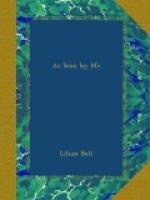A Christmas dinner in a foreign land, in the midst of the diplomatic corps, is the most undiplomatic thing in the world, for that is the one time when you can cease to be diplomatic and dare to criticise the government and make personal remarks to your heart’s content.
It was a beautiful dinner, and after it was over we were all invited to the children’s entertainment at Mrs. Squiers’s. She had gathered about fifty of the American colony for Christmas carols and a tree. Immediately after the ambassador arrived the children marched in and recited in chorus the verses about the birth of Christ, beginning, “Now in the days of Herod the King.” Then they sang their carols, and then “Stille Nacht,” and they sang them beautifully, in their sweet, childish voices.
After these exercises the doors were thrown open, and the most beautiful Christmas-tree I ever beheld burst upon the view of those children, who nearly went wild with delight.
After everybody had gone home except “the diplomatic family,” which for the time being included us, we picnicked on the remains of the Christmas turkey for supper, and there was as little ceremony about it as if it had been at an army post on the frontier. We had a beautiful time, and everybody seemed to like everybody very much and to be excellent friends.
Then Mr. and Mrs. White escorted us back to our hotel, which wasn’t at all necessary, but which illustrates the way in which they treated us all the time we were there.
This ended a truly beautiful Christmas, for, aside from being unexpected and in striking contrast to the forlornness we had anticipated, we had been taken into the families of beautiful people, whose home life was an honor and an inspiration to share.
On New Year’s day we started early and went to Potsdam to visit the palace of Sans Souci.
A most curious and interesting little old man who had been a guide there for thirty years showed us through the grounds, where the King’s greyhounds are buried, and where he pleaded to be buried with them. The guide had no idea that he possessed a certain dramatic genius for pathos, for, parrot-like, he was repeating the story he had told perhaps a thousand times before. But when he showed us the graves of the greyhounds which ate the poisoned food which had been prepared for the King, he said:
“And they lie here. Not there with the other dogs, the favorites of the King, but here, alone, disgraced, without even a headstone. Without even their names, although they saved the great King from death and gave their lives for his. Yet they lie here, and the others lie there. It is the way of the world, ladies.”
Then he took us to the top of the terrace facing the palace, and, pointing to the entrance, he said:
“In the left wing were the chambers of the King’s guests. In the right wing were his own. Therefore, he placed a comma between those two words ‘Sans’ and ‘Souci,’ to indicate that those at the left were ‘without,’ while with himself was—’Care.’”




